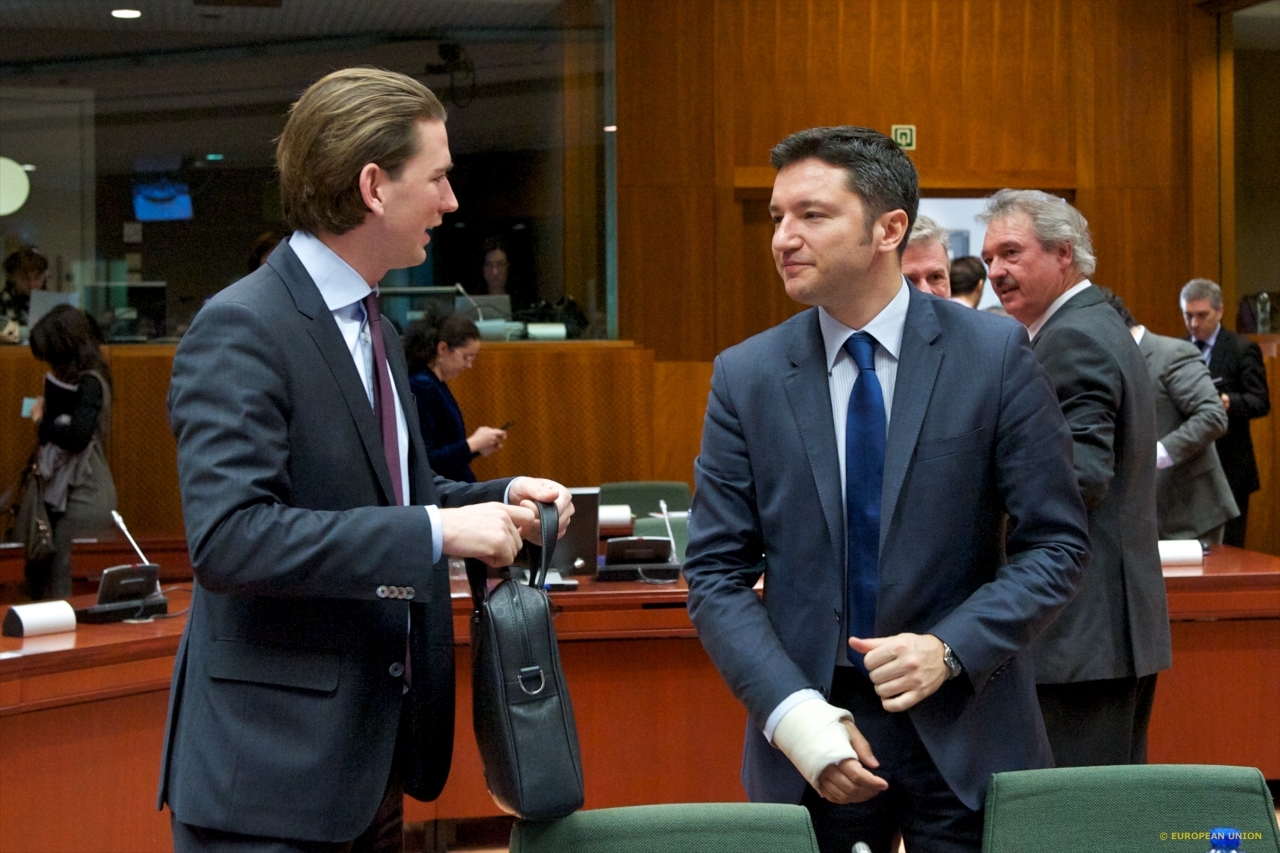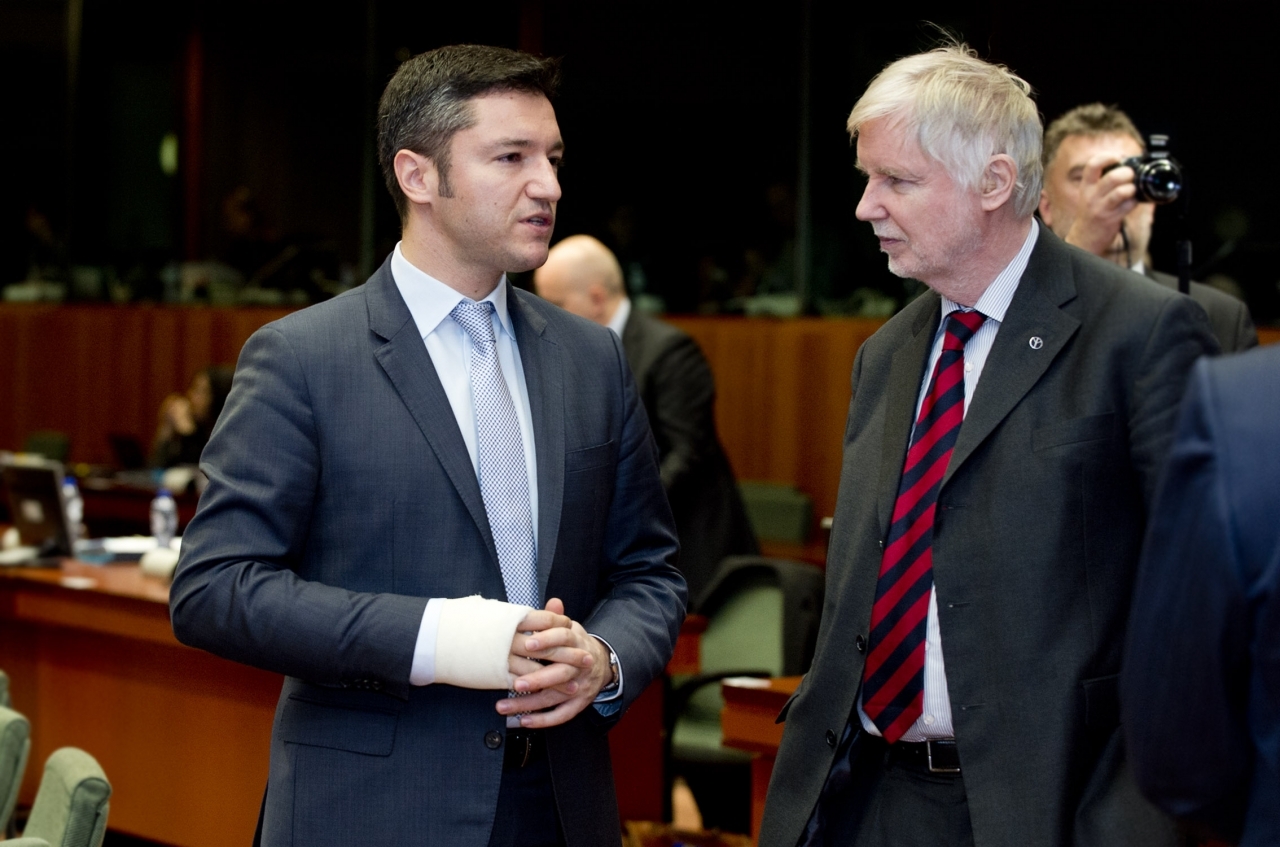Ukraine dominates EU Foreign Affairs Council, the General Affairs Council prepares the European Council in March
11 February 2014 News
Minister of Foreign Affairs Kristian Vigenin finished today his participation in two consecutive Councils in Brussels - the Foreign Affairs Council and the General Affairs Council of the EU (10-11 February). On the first day the Ministers held an extensive discussion on Ukraine, led by the concerns about the continuing crisis in the country. They discussed steps to stop the violence and to reduce tensions in Ukraine and expressed readiness to respond quickly to any deterioration on the ground.
According to the EU foreign ministers the authorities should undertake all necessary measures to respect and protect the Ukrainian citizens' fundamental rights, including their right to peaceful protest, in order to tackle the crisis. The Council conclusions indicate that the formation of a new and inclusive government, constitutional reform bringing back more balance of powers, and preparations for free and fair presidential elections would contribute to bringing Ukraine back on a sustainable path of reforms.
EU does not seek to act as an intermediary, but the Union may provide expert help to Ukraine and reiterates its commitment to signing the Association Agreement as soon as Ukraine is ready. At the same time, the EU expresses readiness to further pursue its efforts with the international community to assist Ukraine, in line with well-established conditions, to find a sustainable way out of the difficult economic situation in the country. The conclusions included also the supported by Minister Vigenin statement that the signing of the Association Agreement, including a Deep and Comprehensive Free Trade Area, does not constitute the final goal in EU-Ukraine cooperation.
The ministers also took stock of the opportunities to support the Republic of Moldova and Georgia in accelerating reforms. The signing of the Association Agreement, including a Deep and Comprehensive Free Trade Area, with Moldova and Georgia are leading policy priorities this year.
A general discussion was held also on the Eastern Partnership after the summit in Vilnius. Bulgaria is a party to two proposals i.e. for the future development and for the financing of the Eastern Partnership. Our country adheres to its principled position in support of the European choice of the Eastern Partnership countries and guaranteeing the right of each to take sovereign decisions.
The Council extensively debated the recent developments concerning the Syrian conflict, in particular the first results of the "Geneva II" peace talks that started on 22 January. The positions of the regime and the opposition remain too distant from the process of political transition, but the conference is a good starting point for building trust between the two countries.
The danger of Syria's conflict overflows into Lebanon and how the EU and MS could help the Lebanese authorities to avoid the risk of further deepening of the instability and the sectarian conflict was also among the topics of discussion.
As regards Iraq, the discussion focused on two main topics: first, the instability in western Iraq and the activities of the "Islamic State of Iraq and the Levant " and second, possible support for an inclusive political process in the context of the upcoming parliamentary elections. There is a possibility deploying an EU Election Assessment Team to Iraq.
Within the discussions on the Southern Neighbourhood, the ministers reviewed the situation in Egypt, Tunisia, Libya and Yemen. Minister Vigenin expressed support for the continued economic support for Yemen 's efforts to improve the security and humanitarian situation. The results achieved by the National Dialogue Conference last month are the first step to successful adoption of the new constitution and the holding of parliamentary and presidential elections. Bulgaria is one of the few states that maintains its diplomatic mission in Sana’a.
The EU foreign ministers considered the adopted by referendum Constitution of Egypt as an important step in the implementation of the roadmap for political transition and look forward to the next stage - the holding of presidential and parliamentary elections in 2014.
The Member States welcomed the adoption of a new Constitution and Tunisia, which enshrines secularism, guarantees fundamental rights and freedomsand gender equality. Tunisia is a good example of a successful implementation of a comprehensive political transition.
The situation in Libya remains a very unstable. The implementation of the transition roadmap is delayed and a general elections could be held as early as 2015.
The Council expressed serious concern on the security and humanitarian crisis in the Central African Republic.It was decided to hold a transitional EU military operation in the country in order to contribute to the security in the region of the capital Bangu , after which the baton to be undertaken by the African Union MISCA . It is expected the initial operating capability of the mission to be achieved by mid- March 2014.
During today's General Affairs Council, Minister Kristian Vigenin welcomed the priorities of the Greek Presidency of the EU, especially with regard to youth unemployment, migration, maritime policy and enlargement. He emphasized the adoption of a common asylum system as an extremely important step for Bulgaria.
Member States approved the agenda for upcoming European Council meeting, which will take place on 20 and 21 March. It will focus on the European Semester, the climate/energy package , industrial competitiveness and the EU relations with Africa. In connection with the proposed by the Commission framework for climate and energy in 2020-2030, Bulgaria supports the establishment of clear, ambitious but realistic and economically viable objectives to the EU. These objectives should be placed in the context of the global efforts to give the Member States some flexibility in their implementation, including through equitable distribution of the financial burden among the Member States.
The main discussion was devoted ministers of the proposal for a Council Decision on placing of genetically modified maize on the EU marketfor cultivation. Most Member States, including Bulgaria, opposed the decision, but according to the procedure their votes were not enough for it to be rejected. Our country maintains a restrictive national policy and legislation on GMOs and will endeavor to limit the application of the decision on the country’s territory.

